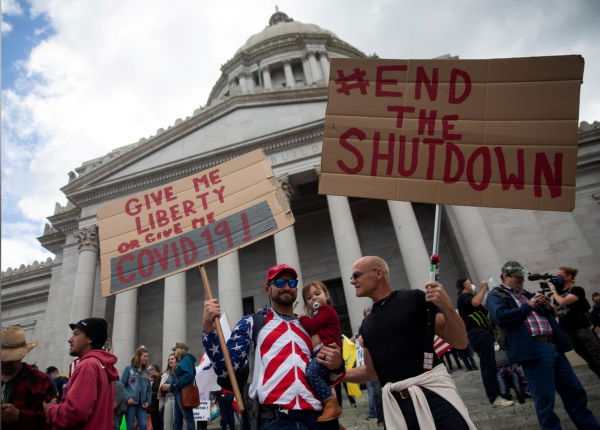The decisive move will show the CPC we mean business.
Federalism in a Time of Coronavirus

Trump has authority to act, and he should.
The next time I hear some well-meaning conservative wax poetic about the virtues of federalism and the states as “laboratories of democracy,” I may tear out what’s left of my hair.
True, the political system created by the Constitution was intended to divide sovereignty between the states and the federal government or, in Madison’s words from Federalist #39, to create a system which was “partly federal and partly national.”
On the other hand, only four essays later, Madison also states that all governments, even state governments, are bound by “the transcendent law of nature and of nature’s God, which declares that the safety and happiness of society are the objects at which all political institutions aim, and to which all such institutions must be sacrificed.” All legitimate governments must secure to their citizens their inalienable rights.
Put another away, there is nothing sacred about federalism if it is purchased at the cost of the liberty of the people.
State History
In American history, the record of the states as guarantors of their citizens’ rights is at best mixed. Often, it has been dismal.
Prior to the formation of the Constitution, state governments engaged in the legalized expropriation of their citizens through the notorious paper money laws, which allowed borrowers to repay debts contracted in specie with worthless paper money and threatened legal action against creditors who refused to accept the paper. The government of Massachusetts could not even protect itself or its citizens against an armed insurrection within the state.
Empowering the federal government to rectify these injustices was a primary motivation for drafting and adopting our Constitution.
From the ratification of the Constitution until the Civil War, the southern states used their authority to deprive millions of human beings of their God-given rights. Slavery was a curse upon our land, expunged at the cost of a cataclysmic bloodletting. It survived and thrived, lest we forget, under cover of “states’ rights.” Many northern states in the Antebellum period were little better; they may have outlawed chattel slavery, but blacks in those states were often deprived of their rights, of security, and of participation in the government that ruled them.
Once again, federalism was the instrument of oppression.
After the Civil War, white supremacists fought a century-long rearguard action, using states’ rights as a cover for Jim Crow segregation and the outright terrorizing of their black citizens. They instituted tenant-farmer laws that reduced the freedmen to virtual serfdom, unable to leave the land they sharecropped and forced to work on whatever terms their former masters imposed. Republican congresses during Reconstruction attempted to rectify the situation through the passage the Civil War Amendments and numerous laws, but they were constantly thwarted by a Supreme Court which overturned the legislation and gutted the amendments—again in the name of states’ rights.
Interstate Compacts
Fast forward to 2020.
Responding to a fast-moving panic about a “novel coronavirus” which had killed thousands in China and was beginning to appear across Europe and the United States, governors across the country began ordering large-scale shutdowns of their states. Americans were ordered to stay home unless absolutely necessary, and businesses deemed “non-essential” were closed.
The full impact of the shutdown is as yet unknown. But millions of unemployment applications have already been filed, and the school year for millions of children was cut short. While initially sold to the public as “fifteen days to flatten the curve,” these shutdowns have dragged on for more than a month.
Governors in the Northeast, Midwest, and Pacific coast regions have only now begun fashioning coordinated plans to re-open the economies of their states.
When Trump tried to push back against these interstate agreements—asserting he had “total authority” on the reopening of the economy—he was denounced by both liberals and conservatives for exceeding his prerogative. Suddenly and amusingly, liberals discovered the virtues of federalism and states’ rights. They found willing allies in some conservatives, but so far these newborn coalitions have been unable to achieve any tangible results.
President Trump and Attorney General William Barr have made noise about responding to state-level overreach, but little more.
Tyrannical States
Let’s be clear. In response to the virus, states have gone far beyond their constitutional remit, directly violating multiple provisions of the Constitution. The federal government has not only the authority, but the obligation to act.
The notion that governors can form any kind of agreement on re-opening the economy, independent of the federal government, is a direct violation of Article I, Section 10 of the Constitution: “No State shall, without the Consent of Congress…enter into any Agreement or Compact with another State.” Absent congressional authorization, these interstate agreements are prima facie unconstitutional.
The substantive power that these states could exercise under these regional agreements is even more constitutionally suspect. The Northeast and Pacific coast regions are commercial powerhouses, and these agreements will directly affect international trade. They will also affect commerce between participating states and non-participating states, as well as commerce between non-participating states and foreign nations. Contrary to California Governor Gavin Newsom, California is not a “nation-state” when it comes to commerce. The Commerce Clause of Article I, Section 8 of our Constitution reads: “The Congress shall have Power…To regulate Commerce with foreign Nations, and among the several States.” The federal government has unambiguous authority over interstate and foreign commerce.
Calling off elections and issuing binding rules of action by executive fiat rather than legislation are open subversions of republican government, which the Constitution anticipates and addresses. Article IV, Section 4 asserts that “The United States shall guarantee to every State in this Union a Republican Form of Government.” Undermining the forms and practices of republican government is specifically prohibited by the Constitution, and the federal government is constitutionally obligated to protect them.
Worst of all are the violations of individual rights by the states, and here again the Constitution provides federal remedies. The 14th Amendment was written in the aftermath of the Civil War, empowering and obligating the federal government to overrule state governments when they violate the rights of their citizens. Its first section reads “No State shall make or enforce any law which shall abridge the privileges or immunities of citizens of the United States; nor shall any State deprive any person of life, liberty, or property, without due process of law; nor deny to any person within its jurisdiction the equal protection of the laws.”
While the courts have argued the subtleties of this language since it was ratified, it appears a few of our governors are running afoul of its spirit. Fining churchgoers and closing churches, arresting peaceful protestors, shuttering businesses, arbitrarily dictating product sales, banning recreational activities and travel and more, all by executive proclamation, are gross abridgements of the liberty and property rights of the people, without even a semblance of due process.
Federal Action
Federalism is certainly a part of our system, and the states do have some sovereign power. But this power is not unlimited.
The exact nature of the remedies at the federal government’s disposal is not perfectly clear. But surely there are more modes of redress available to President Trump than simply to tweet “LIBERATE MICHIGAN!” Barr has threatened legal action against state and local officials who persecute churches and churchgoers; those should certainly proceed, and their scope expanded to other violations. Trump could withhold federal funding from misbehaving states. Ultimately, Congress could pass legislation in the manner of Reconstruction or Civil Rights-era legislation, creating enforcement mechanisms for these provisions of the Constitution.
On the eve of the Civil War, Abraham Lincoln asked “where is the mysterious, original right, from principle, for a certain district of country with inhabitants, by merely being called a State, to play tyrant over all its own citizens, and deny the authority of everything greater than itself?”
The states have acted tyrannically before, and the Constitution empowers the federal government to intervene. It’s high time it did so.
The American Mind presents a range of perspectives. Views are writers’ own and do not necessarily represent those of The Claremont Institute.
The American Mind is a publication of the Claremont Institute, a non-profit 501(c)(3) organization, dedicated to restoring the principles of the American Founding to their rightful, preeminent authority in our national life. Interested in supporting our work? Gifts to the Claremont Institute are tax-deductible.
In wars, men die.
For the first time in centuries, we’re bringing it all back home.
Facing up to the failed state of America's mandarin class
Don’t let the Left use your panic for their gain.
We blew it. Normies are paying a heavy price.






